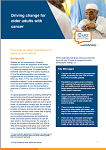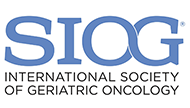Geriatric Oncology as an Unmet Workforce Training Need in the United Kingdom
A Narrative Review by the British Oncology Network for Undergraduate Societies (BONUS) and the International Society of Geriatric Oncology (SIOG) UK Country Group
Cancer is a disease associated with ageing. Managing cancer in older adults may prove challenging owing to pre-existing frailty, comorbidity, and wider holistic needs, as well as the unclear benefits and harms of standard treatment options. With the ongoing advances in oncology and the increasing complexity of treating older adults with cancer, the geriatric oncology field must be a priority for healthcare systems in education, research, and clinical practice. However, geriatric oncology is currently not formally taught in undergraduate education or postgraduate training programmes in the United Kingdom (UK). In this commentary, we outline the landscape of geriatric oncology undergraduate education and postgraduate training for UK doctors. We highlight current challenges and opportunities and provide practical recommendations for better preparing the medical workforce to meet the needs of the growing population of older adults with cancer. This includes key outcomes to be considered for inclusion within undergraduate and postgraduate curricula.
Khoury EG, Nuamek T, Heritage S, Fulton-Ward T, Kucharczak J, Ng C, Kalsi T, Gomes F, Lind MJ, Battisti NML, Cheung KL, Parks R, Pearce J, Baxter MA.Cancers (Basel). 2023 Sep 28;15(19):4782. doi: 10.3390/cancers15194782.PMID: 37835476 Free PMC article. Review.
Keywords: geriatric oncology; medical education; postgraduate; undergraduate; workforce planning.
Geriatric Oncology: the time is now
 ecancer has dedicated a special issue on Geriatric Oncology, entitled “Geriatric Oncology: the time is now”. The Guest Editors are SIOG Members, Nicolò Battisti and Lissandra Dal Lago. This special issue covers different aspects of the care of older adults with cancer, who have always been under-represented in clinical trials, limiting the external validity of guidelines and evidence-based recommendations.
ecancer has dedicated a special issue on Geriatric Oncology, entitled “Geriatric Oncology: the time is now”. The Guest Editors are SIOG Members, Nicolò Battisti and Lissandra Dal Lago. This special issue covers different aspects of the care of older adults with cancer, who have always been under-represented in clinical trials, limiting the external validity of guidelines and evidence-based recommendations.
There is a substantial knowledge gap supporting treatment decisions in this age group and the five articles in this issue make important contributions to the evidence base on geriatric oncology across a range of countries.
Topics include the role of various National Health Service (NHS) initiatives in the UK aimed at this population to the epidemiology of cancer in older adults and the specific challenges for implementing geriatric oncology care in Mexico. The many recent advances in this field suggest that the time is now to implement the principles of geriatrics to the routine care of older adults with cancer and to maximise their inclusion in clinical trials.
All the articles are fully open access and can be read here.
Watch SIOG President-elect 2020-2022, Dr Nicolò Battisti discuss the topics included in this special issue.
Driving change for older adults with cancer
 “Driving change for older adults with cancer” was published by the Union for International Cancer Control (UICC).
“Driving change for older adults with cancer” was published by the Union for International Cancer Control (UICC).
Focusing on older populations to leave no one behind
Background
Globally, we are experiencing a `longetivity revolution´ in which the proportion of the world’s population over the age of 65 is increasing rapidly.(1) There are currently over 703 million people worldwide above the age of 65 years, equating to 9.1% of the global population, and estimates suggest that this is expected to rise to 15.9% (1.5 billion) by 2050.(1) The rate at which the global population is ageing1 is also accelerating particularly in the low- and middle-income countries (LMICs), where the population of over-65s is projected to grow from 37 million in 2019 to 120 million in 2050…(1) <Read More>
Building momentum: People-centred cancer care at all ages
The global ageing population is a hallmark of successful development. The proliferation of policies and programmes to protect and promote health have led to substantial declines in infant mortality and have extended global average life expectancy from 64.2 years in 1990 to 72.6 years in 2019. (1) However, in many places around the world, increases in healthy life expectancy (that is, the number of years lived in self-assessed good health) have not kept pace and an increasing number of older adults are living with one or more health conditions.
Older people living with cancer
More than two thirds of cancer diagnoses occur in people aged over 65 years. However, compared to countries with similar health care systems, the outcomes for older people in the UK following a cancer diagnosis are worse in relation to experiences of care and treatment, quality of life and survival.
Achieving World-Class Cancer Outcomes – A Strategy For England 2015-2020 set out a welcome ambition to improve cancer outcomes, with a review of the cancer workforce recommended as an important activity to achieve this goal. The workforce across health and social care remains a critical component to the story of improving outcomes for older people. Following recent evidence showing trainee oncologists’ confidence to treat older people is low, research has identified an over-reliance on age as a determining factor in decisions about treatment and a lack of skills and training specifically related to ageing within the healthcare workforce core curricula. In light of this, the Expert Reference Group for the Older Person with Cancer – established by Macmillan Cancer Support to bring together patients with health and care professionals to address poor outcomes in older people with cancer – commissioned a review of evidence, and found that the current workforce is not well prepared to meet the needs of older people living with cancer. As the population ages, the gap between what can be provided by the current workforce and what older people actually need is likely to grow. There is evidence that policy and practice is shifting to better reflect older people’s needs, but system-wide effort is required to close this gap.
Touch Oncology
 European Oncology & Haematology and Oncology & Hematology Review enables time-pressured physicians to stay abreast of key advances and opinion in oncological and haematological practice in Europe and the United States.
European Oncology & Haematology and Oncology & Hematology Review enables time-pressured physicians to stay abreast of key advances and opinion in oncological and haematological practice in Europe and the United States.
The journals comprise balanced and comprehensive articles written by leading authorities addressing the most important and salient developments in the oncological and haematological fields. The journals endeavour to support physicians and related healthcare professionals in continuously developing their knowledge and effectiveness.
Guided by an Editorial Board comprising world-renowned experts in their respective sub-specialties, the journal’s editorial policy is designed to promote best practice and encourage discussion among practising professionals in the field.
Cancerworld
![]() Don’t fail to visit Cancerworld – a scientific magazine published six times a year by the European School of Oncology (ESO).
Don’t fail to visit Cancerworld – a scientific magazine published six times a year by the European School of Oncology (ESO).
The magazine gives a voice to health professionals in all fields of oncology and at all levels, and offers a platform to those who are most affected by cancer – the people with the disease.
It includes in-depth interviews with some of Europe’s most influential oncology leaders, who are invited to comment on breaking news, discuss complex and difficult issues and share their experiences in overcoming personal and professional challenges as they have pushed forward the boundaries of their practice.


